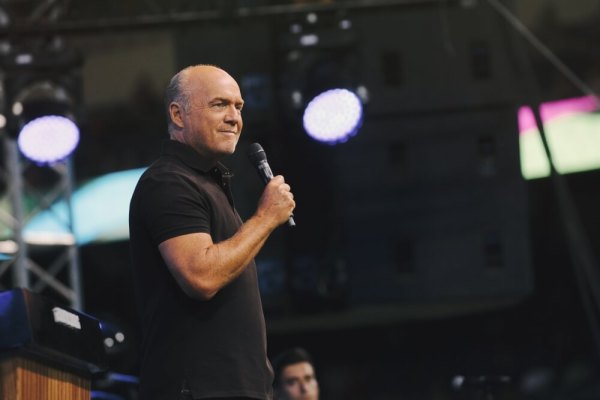How to Slow Your Life Down
You don't have to be a prophet to know that technology has made three things happen in the world. It has made the world smaller, more complex, and faster. You live a much faster lifestyle than your parents did. Your children will live an even faster lifestyle than you do.
McDonalds® now offers a fast-track option so you can be billed automatically and shave 15 seconds off getting your burger. I read the other day that people aren't buying frozen juice as much these days. We simply don't want to wait for it to thaw!
As you and I know, pastors aren't immune to these time pressures. With meetings, ever-shrinking sermon preparation, and a crowded pastoral care schedule, our office calendar can stay full if we're not careful. Then we get home and rush our kids to after-school events, grab a quick dinner, run to the hospital, go home, jump in bed, and hope there are no late-night phone calls.
We can identify with what a USA Today article said about life for many people. "Today people are souped up, stressed out, and over scheduled. In this brave new world boundaries between work and family are disappearing. Everybody is mobile and every moment is scheduled."
The Bible tells us that hurry and worry and scurry have dramatic negative effects on our life and ministries. If you're serious about slowing your life down to a more humane pace of life, you're going to have to make five counter-cultural changes in your lifestyle.
1. Learn contentment. It starts in the heart. Paul says this about contentment in Philippians 4:12 (NIV): "I have learned the secret of being content in any and every situation." Whether we're pastors or not, it's not in our nature to be content. We want life to be different – better. But we can't slow down our lives unless we start being content with what we have.
Contentment doesn't mean you don't want your church to grow. Contentment doesn't mean you don't go after your God-given vision for your church. It just means a bigger church won't make you any happier. Your relationship with Christ is where you find your true joy. Until you come to that conclusion, you won't slow down.
2. Obey the fourth commandment. Most of us would bristle if we were told that we were consistently breaking the Ten Commandments. But, pastor, many of us are. Remember, the fourth commandment? We're to take one day off every week. Are you doing that? For most of us, that's not Sunday. We're preaching, meeting with people, and overseeing the worship services – we're not resting. It doesn't matter which day it is, but we need a day off.
There have been times when I thought I was too busy to take time off. It never worked. I became more irritated with my family. I became more tired. And I didn't get as much done. It was so prideful of me to think that what I was doing at that moment was more important than listening to what God said about how he made me.
I live a very fast life. But every Monday I stop and slow down. I'm not available on Monday. I know a pastor who had a member get mad at him because he tried to call him several times on Monday and couldn't get a hold of him. The pastor said, "Sorry, but that's my day off." The member said, "The devil doesn't take a day off." And the pastor said, "You're right. And if I didn't, I'd be just like the devil."
3. Pause and pray before deciding. Stop and pray about the decisions you make on a regular basis. That doesn't mean you wait a year before deciding something. I'm talking about 10 to 15 seconds. As you sit in an elders meeting or a counseling session, ask "God, what do you want me to do in this instance?"
How does this help you slow down? You're pausing to get perspective. Perspective is what helps you make wise decisions. Most of us just want to make decisions faster, but it's perspective that really makes better decisions.
4. Learn to say no. You can't keep adding things to your schedule without eliminating some. Every time you add a new activity to your schedule, you need to take something off. Whenever I used to see one of my mentors, Peter Drucker, he would say, "Don't tell me what new thing you're doing. Tell me what you've stopped doing." The mark of leadership is knowing what not to do.
Most of us have a hard time saying no to opportunities. So ask yourself two questions every time you're given a new opportunity.
* Is it worth it? With every opportunity you're given, you need to ask yourself whether it's worth your energy, effort, reputation, and ultimately, your time. Your time is your life. And you need to decide whether the new opportunity is worth a portion of your life.
* What am I going to give up? You can't just keep adding, adding, and adding. You have to give something up to take hold of an opportunity. What will it be?
5. Trust God's timing. Impatience is often why we hurry. It's simply a lack of trust. When you're impatient you're saying, "God, I don't really trust you. I don't think you have my best interest at heart. You don't know when I need it, and I'm in a hurry." Is fast always better? No. It is not. Not always.
God has a plan for your life. You know that. But he also has a timetable for your life – and a timetable for your church for that matter. Unfortunately, God never explains his timetable. And that can be frustrating! At Saddleback we waited for years to get our own land and our own building. I couldn't understand God's timing. But God knew exactly what he was doing. Our church campus is visible from one of the busiest freeways in our community. It was a freeway that didn't exist when we first started looking for land. That's God's timing.
It's painful when you're in a hurry and God's not. But it's part of maturing, part of growing up. Children have to learn the difference between "no" and "not yet." God knows the right time and the right way. He has a plan and a timetable.
Ministry is not a sprint; it's a marathon. God doesn't want you to burn out. Whether you're 30 or 70, he doesn't want to wear you out before he can complete his purposes through you. Learning to slow down might be the most important ministry skill you learn this year.




















